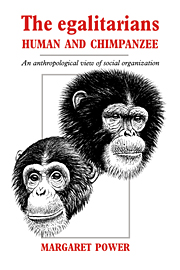Book contents
- Frontmatter
- Contents
- Foreword by A. Montagu
- Acknowledgments
- Part 1 Methods and prefatory explanations
- Part 2 The human foragers
- Part 3 The changing social order
- Part 4 The behavior of wild and provisioned groups: a theoretical analysis
- Part 5 The mutual dependence system
- Part 6 The egalitarian chimpanzees
- Part 7 Probabilities, possibilities and half-heard whispers
- Notes
- References
- Index
Part 5 - The mutual dependence system
Published online by Cambridge University Press: 18 December 2009
- Frontmatter
- Contents
- Foreword by A. Montagu
- Acknowledgments
- Part 1 Methods and prefatory explanations
- Part 2 The human foragers
- Part 3 The changing social order
- Part 4 The behavior of wild and provisioned groups: a theoretical analysis
- Part 5 The mutual dependence system
- Part 6 The egalitarian chimpanzees
- Part 7 Probabilities, possibilities and half-heard whispers
- Notes
- References
- Index
Summary
The principles and patterns, behaviors, interactions and relationships that structure a mutual dependence system require more explanation and substantiation than they have received to this point. Accordingly, in this part of the book, evidence from naturalistic studies of chimpanzees and from field studies of the six human groups who, when studied, lived by an immediate-return foraging system, are used to develop further the model of the basic mutual dependence system as it is among chimpanzees.
In reading the rest of this volume, three earlier mentioned points must be kept in mind. First, it is now generally agreed that chimpanzees share the same range of emotions, and similar mental processes, with humans, though they are technically greatly inferior.
Second, the mutual dependence system as outlined is a model, and a preliminary one at that: a first attempt to understand the adapted social structure of chimpanzees from a new perspective. In reality, chimpanzee social groups will vary from the model. Chimpanzee social behavior, like that of humans, is extremely plastic. Differing ecological conditions will affect local behavior and local traditions. For example, Sugiyama and Koman (1979) found that in the wild group that they studied for 6 months in the vicinity of Bossou, Guinea, one particular male leader, ‘Bafu’, made repeated attempts to keep the entire Bossou group together, going back and forth making barking calls as they traveled, apparently trying to keep together the forerunners and those lagging. This is leader behaviour quite different from that of the model.
- Type
- Chapter
- Information
- The Egalitarians - Human and ChimpanzeeAn Anthropological View of Social Organization, pp. 151 - 194Publisher: Cambridge University PressPrint publication year: 1991



